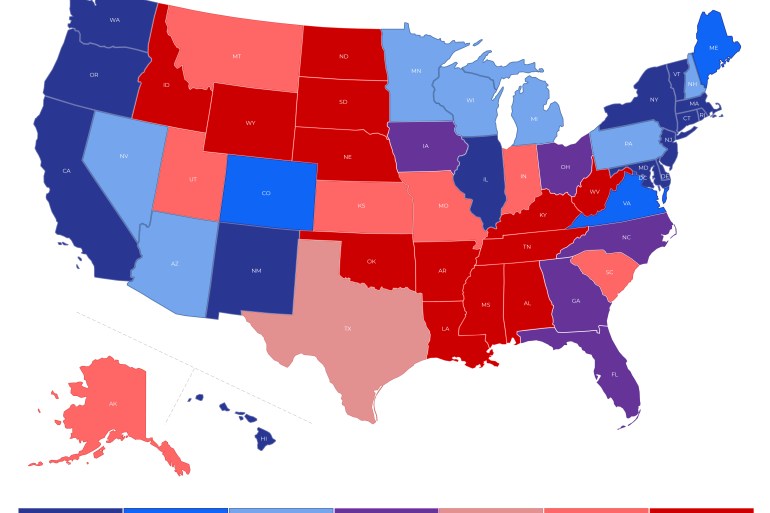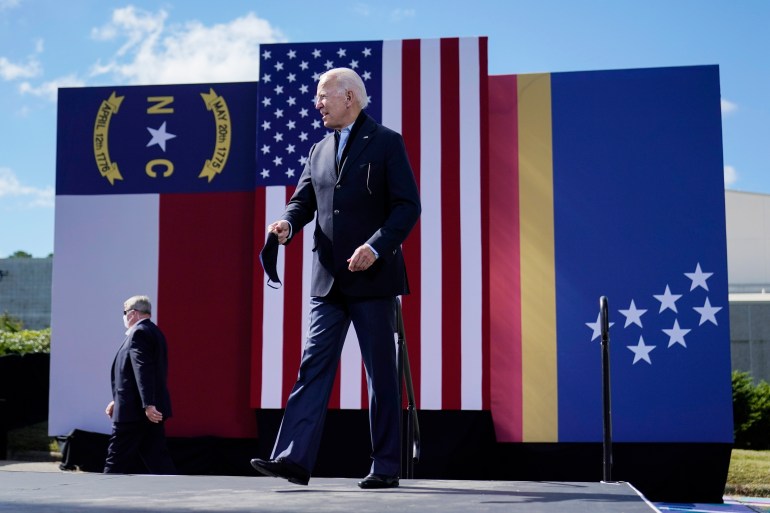To win re-election, the president must sweep five states seen as toss-ups and pull in a few that are leaning to Biden.

Polls show Biden with a lead in the Electoral College and US election forecasters see a narrow window for a Trump victory [Alia Chughtai/Al Jazeera]
President Donald Trump’s path to victory in the US presidential election has narrowed as Democratic challenger Joe Biden opened a lead in key Midwest states and forced Trump to play defence in Republican strongholds once thought safe.
President Trump needs 270 votes in the Electoral College to win re-election and with less than two weeks to go until November 3 he can only count on 164 votes from reliably Republican states including Texas, which is tight.
Indeed, the Electoral College mathematics are challenging for Trump. Trump’s political advisers believe he must win Florida, Ohio and North Carolina – states that polls and analysts say are toss-ups and where Biden is competing. And he needs a combination of the Midwest states that gave him the presidency in 2016 – Pennsylvania, Michigan and Wisconsin – where Biden now holds an advantage.
“He’s going to need to win all of the states we have as toss-ups plus a couple of states we have leaning to Biden at this point,” said J Miles Coleman, a data analyst at the University of Virginia Center for Politics.
It is a quirk of the American constitutional system that a candidate for president can lose the popular vote but still win the presidency by gaining a majority of 538 delegates in the Electoral College.
Each state is awarded a number of delegates in the Electoral College based on population. In 48 states and the District of Columbia, whoever wins the most votes, wins their delegates. Maine and Nebraska award two delegates each based on the popular vote and remaining delegates by congressional district.
In 2016, Hillary Clinton won the nationwide popular election by 2.86 million votes, but Trump gained 304 votes in the Electoral College to take the White House in a surprise upset. This year the dynamic is different, Coleman said.
Trump is not the outsider campaigning against the establishment. He has been president for four years and voters are judging him on his record. “This year is going to be more of a referendum on Trump,” he told Al Jazeera.
To see how Trump faces an uphill climb to get to 270 in the Electoral College, it helps to do the maths. Trump starts off with 164 delegates from reliably Republican states.
The candidate’s travel schedules since the conventions in August offer clues to where the campaigns think they must win, where they think they can take a state from their rival and where they need to shore up their base.
Both Biden and Trump’s campaign travel have focused heavily on Florida and Pennsylvania.
This week, Trump is traveling to Michigan and Nebraska and will make a trip to Arizona. Biden will be in Georgia and Florida and plans a trip to Texas, all three states that Trump cannot afford lose.
Vice President Mike Pence is campaigning in Minnesota and will travel to North Carolina. Democratic vice presidential nominee Kamala Harris is campaigning in Nevada and former President Barack Obama has been campaigning with Black and Latino groups in Pennsylvania and Florida.
The tier of competitive states Trump must win are five that he won in 2016 but now are rated by independent forecasters as toss-ups, where Trump’s odds are even with Biden’s at 50-50, like the toss of a coin. Those are Georgia, Ohio, Iowa, North Carolina and Florida that combined account for 84 Electoral College delegates.
Winning all five would bring Trump to 248 in the Electoral College count. But he cannot afford to lose any of those states and indicative of the trouble he is in, Trump campaigned recently in Georgia and Iowa, two states where Biden and Democrats running for the US Senate are competitive.

Georgia state legislator Vernon Jones crowd surfs during a campaign rally for President Donald Trump at a regional airport in Macon, Georgia, on October 16 [John Bazemore/AP Photo]
“Just the fact that he has to do boisterous campaigning … in a state of marginal importance – speaks volumes,” said Mack Shelley, chair of political science at Iowa State University.
A largely rural and agricultural state located in the heartland of the US, Iowa only has six votes in the Electoral College. “If he is having to work hard for six votes, that indicates – if not desperation – serious concern,” Shelley told Al Jazeera.
At an airport rally on October 14, in Des Moines, Iowa’s largest city in the centre of the state, Trump drew cheers from a large crowd of supporters.
“There’s never been a president that has done more for farmers and ranchers, for the farm belt, for Iowa,” Trump said, citing $28bn in subsidies Congress has provided to compensate for farmers’ losses nationwide because of Trump’s trade war with China.
“I hope you remember that on November 3,” Trump said, noting he is “a little bit concerned” about polls showing a close race in Iowa.

President Donald Trump appeared on October at a large campaign rally at Des Moines International Airport in Iowa, a state he cannot afford to lose to Biden on November 3 [Charlie Neibergall/AP Photo]
Trump’s approval among voters in rural areas of Iowa where the economy is tied to soybean and corn production has been slipping, according to data analysed by political scientists at Iowa State.
Trump’s tariff battles with China caused a collapse in soybean prices that hurt Iowa farmers badly.
“If he loses five points in rural Iowa, he is going to lose the state,” Dave Peterson, a professor of political science at Iowa State, told Al Jazeera.
Trump faces similar challenges elsewhere. He campaigned in Macon, Georgia, where he drew several thousand to a rally on October 16.
“Eighteen days from now we’re going to win the state of Georgia. We’re going to win four more years,” Trump said.
The most recent public opinion polls, however, show Biden leading in Georgia and two Democratic US Senate candidates are competitive.
Biden campaigned in North Carolina on October 18, his second visit to the Republican-leaning state that Trump won in 2016 but where Biden now leads in polls and Democrats are battling for a US Senate seat.

Democratic presidential candidate former Vice President Joe Biden campaigned in Durham, North Carolina on October 18, 2020 [Carolyn Kaster/AP Photo]
Biden slammed Trump for misleading the American public on the coronavirus pandemic.
“As my grandfather would say, this guy’s gone around the bend if he thinks we’ve turned the corner. Turning the corner? Things are getting worse,” Biden said.
The election in these key Electoral College states is likely to come down to how independent voters perceive Trump’s handling of COVID-19, said Timothy Hagle, a professor of political science at the University of Iowa.
“They are going to be focused on kitchen table issues, jobs and healthcare,” Hagle told Al Jazeera.
“The pandemic has hurt people economically and the question is, are they going to blame Trump?”

 Polls show Biden with a lead in the Electoral College and US election forecasters see a narrow window for a Trump victory [Alia Chughtai/Al Jazeera]
Polls show Biden with a lead in the Electoral College and US election forecasters see a narrow window for a Trump victory [Alia Chughtai/Al Jazeera] Georgia state legislator Vernon Jones crowd surfs during a campaign rally for President Donald Trump at a regional airport in Macon, Georgia, on October 16 [John Bazemore/AP Photo]
Georgia state legislator Vernon Jones crowd surfs during a campaign rally for President Donald Trump at a regional airport in Macon, Georgia, on October 16 [John Bazemore/AP Photo] President Donald Trump appeared on October at a large campaign rally at Des Moines International Airport in Iowa, a state he cannot afford to lose to Biden on November 3 [Charlie Neibergall/AP Photo]
President Donald Trump appeared on October at a large campaign rally at Des Moines International Airport in Iowa, a state he cannot afford to lose to Biden on November 3 [Charlie Neibergall/AP Photo] Democratic presidential candidate former Vice President Joe Biden campaigned in Durham, North Carolina on October 18, 2020 [Carolyn Kaster/AP Photo]
Democratic presidential candidate former Vice President Joe Biden campaigned in Durham, North Carolina on October 18, 2020 [Carolyn Kaster/AP Photo]

Comments
Post a Comment